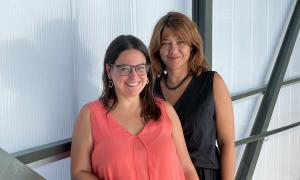Medical and socio-economic factors are associated with the risk of suffering and recovering from long COVID

Two-year follow-up of 548 people who have had COVID-19 shows that gender, illnesses prior to diagnosis, and educational level are predictive factors for the development and recovery of long covid condition
Thousands of people in Spain suffer from the Post-COVID-19 Condition or long covid, a disabling disease that is a great problem for those who suffer from it, as well as a great challenge for health systems. The follow-up of 548 people who have suffered from COVID-19 has made it possible to identify medical and socioeconomic factors that are associated with the risk of developing and recovering from post covid-19, and has observed that recovery is a minority during the first two years of illness. The data obtained highlight the importance of preparing health systems so that they have the capacity to respond to all people who suffer from post covid-19.
This is the main conclusion of a study carried out by the long COVID Unit of the Germans Trias Hospital, the Fight Against Infections Foundation and the IrsiCaixa AIDS Research Institute – a center jointly promoted by the “la Caixa” Foundation and the Department of Health of the Generalitat of Catalonia. Studies such as this one, which is published today in The Lancet Regional Health - Europe journal, are key to advancing our knowledge of a syndrome that is still little known, such as long covid.
It is estimated that 5-10% of people who survive COVID-19 continue with a wide range of symptoms months after infection. "It is essential to define and understand this syndrome and its implications in order to identify prevention, diagnosis and treatment strategies to help those affected. With this objective, and in a pioneering way, we decided to carry out an exhaustive and prolonged follow-up of patients," explains Lourdes Mateu, coordinator of the Long Covid Unit at Germans Trias Hospital. Mateu points out that: "the large number and variety of organs and systems affected by long covid, as evidenced by multiple international studies, requires us to work in a multidisciplinary and coordinated way between hospitals and primary care. This is still a little known disease, but it is real and has a great impact on patients and society as a whole. It is necessary to combine empathetic clinical care of the highest human quality with rigorous research that allows us to find better diagnostic tools and effective treatments. It is essential to work in a network, listening to and actively involving those affected".
Women and people with co-morbidities are most affected by long covid
The study cohort consists of 548 people who underwent COVID-19 more than 2 years ago, of whom 207 recovered fully and 341 developed long covid. "This is one of the largest and longest follow-up studies of the clinical evolution of people with long covid carried out to date," says Marta Massanella, principal investigator at IrsiCaixa.
Statistical analysis of these two groups of people has identified, on the one hand, that men with higher education are less likely to develop long covid. On the other hand, it has been found that women, people with a history of autoimmune diseases, or those who experience fatigue, tachycardia, choking, or neurocognitive and neurosensory disturbances during acute COVID-19 are at higher risk of developing it and less likely to be cured over time. In this line, an independent US study recently published in the journal Nature Medicine has shown, in a cohort of more than six million people, that long covid can lead to a higher level of disability than heart disease or cancer.
The use of questionnaires has made it possible to group patients into 3 groups according to symptoms, results that are consistent with a previous study also carried out in the United States. These 3 groups are not mutually exclusive, but are differentiated by the accumulation of symptoms and are ordered from A to C, with A being the group with the fewest symptoms and C the most.
An unusual recovery
The study also highlights that, of all the people in the study with long covid, only 7.6% have recovered within the first 2 years of suffering from the syndrome. Of the 26 people who recovered, the majority (24) were in the least symptomatic group. Factors that may have been associated with a higher likelihood of recovery were male sex, people who had required admission to the ICU due to COVID-19 or who had cardiovascular comorbidities, lack of hunger and alterations in taste and smell. Muscle pain, decreased alertness, dyspnea or tachycardia are symptoms associated with a lower likelihood of recovery.
"The low cure rates of long covid indicate that as long as SARS-CoV-2 transmission continues, cases of people with this condition will continue to accumulate. European health systems, including ours, must address this problem and be prepared to absorb and manage the existing demand for a disease that is very real and continues to increase," adds Roger Paredes, head of the Infectious Diseases Department at Germans Trias Hospital, principal investigator at IrsiCaixa and adjunct professor at Case Western University.
In short, studies such as this one allows a better understanding of the syndrome and are key to progress in the management of this new disease. Also, the results emphasize the urgent need to find new diagnostic markers and therapies to improve its prevention and cure.